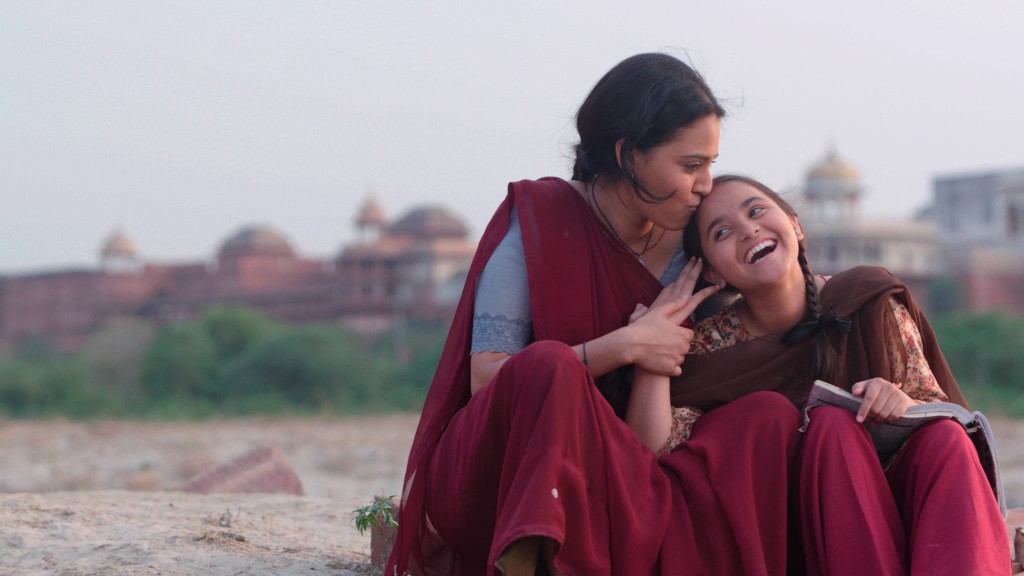The title might confuse you as it confused me but when one is focussed on a film, does it matter that the title is an old and forgotten Hindi idiom – zero divided by zero? Even if the story is focussed on the volatile relationship between a young widow Chanda (Swara Bhaskar) who works at several jobs but mainly as a domestic maid and her daughter Apeksha (Ria Shukla) who is in the tenth standard but is not interested in passing her examinations. Her logic is apparently sound. “A doctor’s son becomes a doctor, an engineer’s son becomes an engineer, a driver’s son becomes a driver so a bai’s daughter will also become a bai,” she tells her mother in her no-nonsense manner that is her credo.
Nil Battey Sannata uses the mother-daughter story with its few ups and many downs to draw other sub-plots of how determination and focus can be used as assets to overcome the struggles of everyday life. The film scores not only in terms of its simple storyline but also in terms of the screenplay and the director’s ability to flesh out every single character so that they appear credible against a realitistic setting. The principal of the school where Appu (Apeksha) studies and fails in Math every time, portrayed wonderfully by Pankaj Tripathi, is like a headmaster walking out of the classroom of any ordinary government school, puffing up his chest as he paces up and down the classroom, takes sarcastic pot-shots at the back-benchers who are almost determined to pluck in their finals, and is surprised when Chanda scores good marks in ‘Mas’ or Maths, which she finds as difficult as her daughter does.
In her debut film, Ashwiny Iyer Tripathi has taken pains to keep the cinematographic and production values of the film distanced from any flavor of glamour. The setting, mainly through the lanes and by-lanes of poor alleys in Agra, offers us a glimpse of an Agra few of us have been privy to. The costumes are a spillover of the ordinary and the mundane except the posh home of Chanda’s boss who drives her own car while her husband is content to hover in the background like a shadow.
The dialogues are funny, intelligent and pithy in turns and acquire strength of their own as the film moves on. The Hindi teacher asks the students to write an essay on ‘My Dream’. Pintoo, the thick-haired last bencher later comments, “Can being a driver be called a dream at all?” with a sad face. The music and the songs are low key and good but one still wishes that the film could have worked without the songs and only the music. At times, specially when Chanda is explaining her home-spun philosophies to her daughter on the ghats with the Taj in the distance, the film becomes a bit pedagogic though the editing cuts this with scenes that have happened in the past.
The best part about the script lies in the way it depicts the change in Chanda’s character, the ‘matric fail’ who is determined that her daughter will not be a ‘matric fail’ and finds herself becoming a student after many years. This critic has actually interacted with the mother of a young girl who sat for her graduation examinations along with the daughter because her daughter triggered in her the need for a good education. In Nil Battey Sannata, it is the mother who brings herself to give competition to her unfocussed daughter who has no dreams in life and does not want to pass her ‘matric exam’.
Swara Bhaskar finally gets a role in Chanda that offers her ample space to uncover her talents layer by layer – as the constantly distraught mother, as the more-than-punctual domestic who reports much earlier for work than her boss expects her to, as the woman who epitomizes a ‘slumdog’ version of the Goddess Durga with ten hands. She works in a masala factory, a shoe factory, a collective laundry just to save money for her daughter’s higher education. In the meantime, she manages to meet the head of a tutorial class and pays visits to the collector through heated arguments with the security guards. Bhaskar’s Best Actress Award at the Silk Road International Film Festival in China is more than justified. But the sudden objection to the film’s release by the National Commission for Protection of Child Rights (NCPCR) on grounds that it violates child rights by depicting corporal punishment of children in the classroom is not justified because such corporal punishment does not exist in the film.
Ria Shukla as the adolescent daughter who loves her mother but has disturbing ways of showing it, or, hating the threat of her mother excelling her in Maths, or, not wanting her to work in a dhaba till late in the night matches her scene for scene. In particular, the sequence where Appu lashes out at her mother just as they are dipping into their plates of chow mein is touching. It is an example of how much a mother has to take from her child. Ratna Pathak Shah is fine as Chanda’s main boss in whose house she works as an all-purpose maid is eager to help her but stops at that and keeps away from involvement. Sanjay Suri is a bit too sweet and syrupy for a collector but that is the script’s fault and not his.
Some have called Nil Battey Sannata a ‘women’s film’. I beg to differ. It is a humane film because it spans the entire map of people deprived of a normal, healthy existence in the same society where others wander across in fancy cars and study in elite schools.
Hindi, Drama, Color


